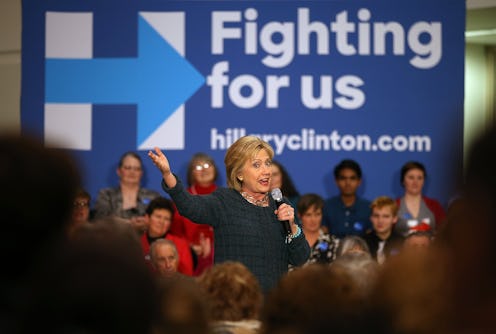News
The Distinction Between A Caucus & A Primary
As both the GOP and Democratic presidential candidates crisscross the state of Iowa — from the Missouri River to the Mississippi, headed from one small-town Pizza Ranch to a neighboring hamlet's library — there's one big difference compared to other upcoming states: There's no primary vote. Nope, no vote! While out on the campaign trail, the candidates are asking supporters to go and caucus for them instead. The main difference between the caucus and primary systems is that on "election day," or as it's called in Iowa, "caucus day," registered Iowa voters go to a meeting in person to pledge their support.
Instead of merely simply going in, casting a ballot, and heading home — at any point during the day like in a primary — caucus-goers usually have to stay a few hours. And they all have to show up at the same time. The schedule can change from precinct to precinct and district to district, but it's usually in the evening, at 7 p.m. You might head to your local library, high school, or old folks' home. What happens next depends on if you're a Republican or a Democrat. The political parties control the process — not the state, like in a primary — so the rules are actually pretty different.
If you're a Republican, it's pretty simple really. The first item on the agenda is the "presidential preference poll." Voters are allowed to campaign for candidates — unlike in a primary — but the voting is still done on paper. Then there's some other business, like electing committee members, convention delegates, and discussing adding or amending planks to the party's platform.
The Democrats have a more complicated system. At the beginning of the night, caucus-goers divide into groups based on who they would support (they have it easy this year, as there are just the three candidates). Then if there's a group that's too small to be considered "viable," it is broken up and their members are given the option of supporting another candidate. In the past, that was 15 percent of the attendees in that precinct. Since you go stand with all the people supporting your candidate, the choice you make is also not a secret.
According to Iowa Public Television, with the exception of one experiment with a primary early in the century, Iowa has always used caucuses to award their delegates in the presidential election. The winners don't always go on to capture the nomination, though. While Barack Obama's strong 2008 victory propelled him to the top of the national stage, that was not the case for Mike Huckabee in 2008 or Rick Santorum in 2012.
Whether you get to vote in Iowa — or more likely not — make sure to tune in for the results. This election's finally getting somewhere.
